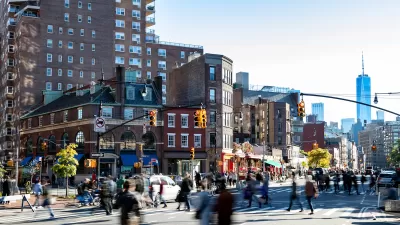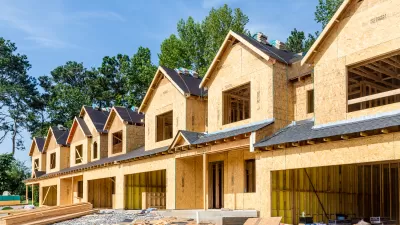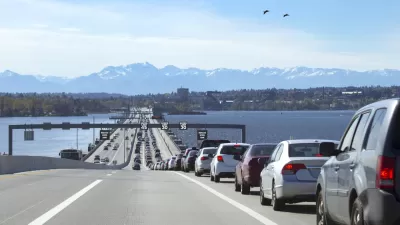Ben Adler of Grist makes a convincing case of why we should stick with gas taxes and not switch to a road usage charge, as Oregon will do July 1 in a limited program. Tax what you burn, not by how much you drive, he argues, to get the best results.
Americans are driving less and are driving more efficient cars, meaning they consume less gas per capita." While good for the environment, it "means we’re generating less gas-tax revenue even as our infrastructure needs increase."
Adler thinks Oregon and the other states, including California, should be more focused on increasing gas taxes than charging drivers based on how much they drive.
Oregon has been a green leader, so you might assume this is a green idea. It’s not. Raising the gas tax is a much better way to fund roads.
Adler made a strong environmental case for a per-gallon as opposed to a per-mile funding system in his 2009 piece in The Atlantic:
If you are concerned about global warming you should be encouraging people to switch to more efficient cars, and one way to do so is by taxing gasoline. It is pollution, not traveling per se, that we should tax. Moving goods and services is not a bad thing, especially during a recession. Pollution, on the other hand, always is a bad thing.
Should the overriding principle in maintaining roads and bridges be based on what is sustainable for the planet, or what is sustainable for keeping infrastructure in good repair? That was a fundamental question I encountered by road usage charge advocates at the International Bridge, Tunnel and Turnpike Association (IBTTA)Transportation Finance & Road Usage Charging Conference in Portland last month.
Oregon sees its road usage charge as a continuation in its national leadership in transportation funding, as Congressman Earl Blumenauer (D-Ore.) made clear in the keynote address at the conference. It was the first state to charge a gas tax in 1919, 13 years before the one-cent federal gas tax authorized by the Federal Revenue Act of 1932. Come July 1, it will be the first to charge based on miles rather than gallons. And the Oregon Department of Transportation (ODOT) makes not only an infrastructure case for doing so, but an equity justification as well:
New fuel-efficient vehicles tend to have a high price tag and more affluent people buy them. Lower income motorists are more likely to drive older, less efficient vehicles; thus, they pay a large amount of gas tax for the road system while those with highly fuel-efficient vehicles pay very little (or none at all).
Adler recognizes that "(s)ome people view the fact that electric cars escape taxation under a gas tax as an unfair free ride. Maybe so, in a narrow sense, but that’s a lesser evil than taxing an eco-conscious driver of a tiny Smart car the same amount as someone driving a Hummer."
There may be a middle ground. As Professor Asha Weinstein Agrawal of the Mineta Transportation Institute pointed out on the last day of the IBTTA conference, the public sides somewhat with Adler's perspective in that there is preference for an environmental component to the mileage fee rather than it being a flat rate, as ODOT will charge the 5,000 registrants in the OReGO program on July 1.
Adler's solution to rising vehicle fuel efficiency that reduces road revenues is to "simply [my italics] raise the gas tax and set it to keep increasing gradually every year — say, inflation plus 1 percent — to stay ahead of the curve."
Tell that to Gov. Bill Walker (R-Alaska) who has yet to sign a .95 cent gas tax legislation to pay for oil spill prevention, or the Missouri legislature that failed to pass a gas tax bill this year after several attempts. Alaska hasn't increased its gas tax in 45 years; Missouri 19 years.
Or tell that to Massachusetts legislature that passed a gas tax so small in 2013 that then-Gov. Deval Patrick vetoed it in hopes they would pass a bigger one, but they did tie future increases to inflation, as Adler advises. The indexing was defeated by the very blue voters of Massachusetts in a referendum last year. The voters appeared to send a clear message: We want you to vote to struggle to increase gas taxes, not have the Consumer Price Index do it for you.
That said, more states, particularly red ones, are recognizing with gas prices the lowest in six years, the time is right to increase gas taxes, as recently discussed in The Atlantic. We noted the first seven states here to pass gas tax increases this year here.
Adler closes his piece by writing that it makes sense to go with one solution to get two results:
"A VMT tax has one main effect on citizens’ behavior: It discourages them from driving," he concludes. "A gasoline tax has two: It discourages driving and it encourages people to drive more fuel-efficient cars, or cars that don’t rely on gasoline at all. Why not go with the tax that gives you more bang for your buck?"
FULL STORY: Why it’s a bad idea to tax people for every mile they drive

Pennsylvania Mall Conversion Bill Passes House
If passed, the bill would promote the adaptive reuse of defunct commercial buildings.

Planning for Accessibility: Proximity is More Important than Mobility
Accessibility-based planning minimizes the distance that people must travel to reach desired services and activities. Measured this way, increased density can provide more total benefits than increased speeds.

Fair Housing Cannot Take a Back Seat to ‘Build, Baby, Build’
If we overlook fair housing principles in the plan to build US housing back better, we risk ending up right back where we started.

LA Metro Board Approves New 710 Freeway Plan
The newest plan for the 710 corridor claims it will not displace any residents.

Austin’s Proposed EV Charging Rules Regulate Station Locations, Size
City planners say the new rules would ensure an efficient distribution of charging infrastructure across the city and prevent an overconcentration in residential areas.

Making California State Parks More Climate-Resilient
A recently released report offers recommendations for keeping state parks healthy and robust, including acquiring additional land for conservation and recreation.
City of Costa Mesa
Licking County
Barrett Planning Group LLC
HUD's Office of Policy Development and Research
Mpact Transit + Community
HUD's Office of Policy Development and Research
Tufts University, Department of Urban and Environmental Policy & Planning
City of Universal City TX
ULI Northwest Arkansas
Urban Design for Planners 1: Software Tools
This six-course series explores essential urban design concepts using open source software and equips planners with the tools they need to participate fully in the urban design process.
Planning for Universal Design
Learn the tools for implementing Universal Design in planning regulations.
























